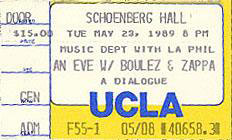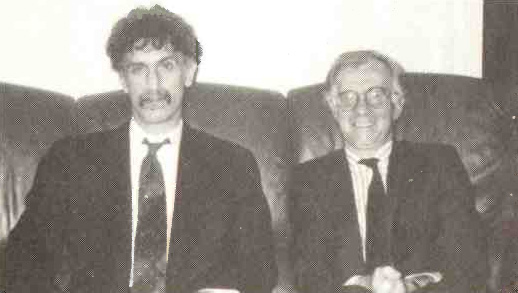[June 12, 1989]
Hi, this is Gail Zappa! [...] Frank wants to talk to you!
[...] He wanted to interview me for the position of "personal assistant." What did this entail, I asked? Well, he wanted someone to be able to set him up on the Synclavier so patch X was loaded and patch Y was filed correctly and he was impressed with my secretarial skills and wanted someone who could help him handle his new company, WhyNot, which was going to do business in Eastern Europe and Russia.
[June 14, 1989]
I'm ushered into the house and into the living room where Frank is talking with a business type. [...] And then finally it was my turn. [...] We meandered our way through a few rooms and ended up at a piano (not in the studio). He says, "sit down and play something." [...]
Then we went to the studio. [...] He introduces me to Bob Stone and we sit over in the corner, he on a couch and me on a chair. He's got my resume with him and wants to get down to details. The music is going on and off as Stone mixes away. [...] He did the standard job interview thing with me for quite some time—maybe 45 minutes. [...] The whole time was really intense, and my amazement at his routine grew moment by moment when—in the middle of a long threaded discussion about the work and my abilities, etc.—he would, without changing the tone of his voice, give Stone an order or suggestion about the mix. "Sweeten that applause" came at one point—"bring up that bari sax"—etc. etc.
[...] Then he excused himself and eventually Stone took a break and I was in that studio all by myself for quite a long time. [...] Bob Rice came in and we talked for awhile. He was there to "clean out his desk." He tried to assure me that even with my minute MIDI knowledge, I could "pick it up." He was really nice and gave me his phone number and offered to help.
[...] Eventually Frank returned. I'm afraid I had made up my mind that this wasn't going to work—mainly because, as I said previously, in my heart I knew I wasn't capable of the long demanding hours—and there was the whole matter of moving to Los Angeles from our longtime home here in Tucson. My wife is a settled professional and our oldest was just starting school, and it would have been a tough move. In any case, I ended up having back surgery in November. [...]

